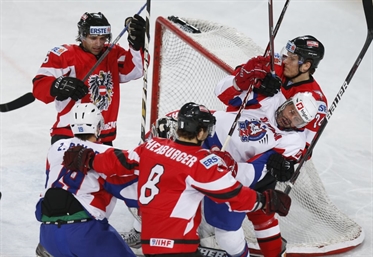Looking for history
Looking for history
Either Austria or Slovenia will reach top-8

 Austria and Slovenia most recently met in 2012 in IIHF play. Expect another tight clash. Photo: Samo Vidic
Austria and Slovenia most recently met in 2012 in IIHF play. Expect another tight clash. Photo: Samo Vidic
Thanks to Austria’s 3-1 win against Norway and Slovenia’s victory against Slovakia with the same score, both teams finished better than their seeding suggested. In the overall preliminary round ranking, the Austrians took 8th place and Slovenia 9th.
This also means that the underdogs will confront each other in the qualification playoffs for the 5th to 12th ranked teams and one of them will go on to the quarter-finals.
The last time Austria reached a top-8 position in Olympic ice hockey was on home ice in Innsbruck 1976 when the “eagles” finished in 8th place. After that Austria only repeated the success once in international ice hockey, with another 8th-place finish at the 1994 IIHF Ice Hockey World Championship in Italy where the team reached the quarter-finals before being blanked 10-0 by Finland.
Since then they haven’t been better than 10th (in 1999) and were relegated to Division I in 2005 (on home ice in Vienna and Innsbruck), 2007, 2009, 2011 and 2013 while earning promotion in even years.
Slovenia and Yugoslavia have never reached the quarter-finals at all in top-level hockey. Yugoslavia, with a predominantly Slovenian roster, peaked at 9th place in the 1968 Olympic Winter Games in Grenoble.
Slovenia appears at the Olympics for the first time and only played seven times in the top division of the IIHF Ice Hockey World Championship since becoming independent in 1991 and most recently suffered relegation in its last participations in 2006, 2008, 2011 and 2013. Its best finish was 13th place reached in 2002 and 2005.
Continue readingThe very fact that these teams made it to Sochi was a surprise based on the World Ranking. In the Final Olympic Qualification Austria had to eliminate Germany and Italy to earn its ticket to Sochi. At the same time Slovenia outstripped opponents it normally loses to, Denmark and Belarus.
The teams had mixed results in head-to-head games in IIHF play. In the last encounter Slovenia defeated Austria in 2012 in Division I play on home ice in Ljubljana, 3-2. The year before, Austria beat Slovenia 3-2 in the World Championship in Slovakia but neither team escaped relegation. The most recent game before was in 2005 when Slovenia defeated Austria in relegation play in Innsbruck, 6-2, to send the hosts down to Division I.
However, the fact that these nations only had three games that matter in the last nine year doesn’t mean they are strangers to each other.
“Both teams are happy to play against each other. Everybody is saying that we have played against Austria many times before but each time it is a completely different team. We have never played each other with the best Austria and the best from Slovenia,” Slovenian goalie Robert Kristan said.
“They have skilful players. Their first line is made up of players from the NHL and those guys can score, so we have to be ready. But the other guys we have played against our whole lives.”
The neighbours are culturally and historically linked despite a mountain range between them and their totally different languages. This is thanks to hundreds of years together in the Habsburg, the Austrian and Austro-Hungarian Empire until early in the 20th century. They share some similar food, folklore and music – and a passion for hockey.
From the Austrian hockey town of Villach to its Slovenian counterpart Jesenice, where Anze Kopitar grew up, it’s just a 30-minute ride through the Karawanks highway or train tunnel.
This short distance and financial problems of domestic clubs led the Austrian-based league EBEL to invite Acroni Jesenice to its league in 2006 – the start of making it a cross-border league that also saw another Slovenian team, Olimpija Ljubljana, and clubs from Croatia, the Czech Republic, Hungary and Italy participate.
This and many exhibition games between the national teams including a scrimmage shortly before the Olympics ensure that the opponents are common faces.
“It’s a team with structure that works hard, similar to us. I think it’s going to be a good battle,” Austrian star Thomas Vanek said.
It’s the first time these teams meet with a full complement of NHL players, and there are several factors which might be decisive. First we have world-class players. Vanek’s class is well-known while his teammate Michael Grabner is the tournament’s top goal scorer with five markers in three games.
Anze Kopitar is Slovenia’s only NHL player and has been a dominant force on the first line and one of the best players in the face-off circle at the tournament so far with 42 won face-offs (72.41%).
The Slovenes also have some up-and-coming players including Ziga Jeglic, the team’s scoring leader with two goals and one assist.
Depth is another keyword where both teams have similar qualities with players coming from the EBEL and other European leagues.
“We have to play the same way we played against Norway, really compact in our end, no odd-man rushes. Just do the basic things, the little things right and take advantage of our chances,” Austria’s Michael Raffl said.
The result will make history for one of these two teams – and set up a quarter-final meeting with Sweden tomorrow before the teams will meet once again one level below.
After relegation in the 2013 IIHF Ice Hockey World Championship in Sweden and Finland, both teams will play in the 2014 IIHF Ice Hockey World Championship Division I Group A in Korea in April. While they are playing for Olympic medal dreams in Sochi, they’ll have to battle for return to the World Championship’s top level in two months in Goyang.
Back to Overview











































